9 Best Green Energy Stocks to Buy Now
The future for renewable energy is bright, and these green energy stocks are poised to profit on the growing trend toward sustainability.


Green energy stocks should get a lift thanks to the clean energy incentives in the Inflation Reduction Act (IRA), along with the dual catalysts of rising demand and lower costs.
According to Deloitte's "2023 renewable energy industry outlook," the IRA extends wind and solar tax credits for projects that started construction before 2025 and tech-neutral credits through at least 2032.
State clean energy policies also provide a boost, with 22 states and Washington, D.C., targeting 100% renewable energy or 100% carbon-free electricity by 2040 to 2050. Moreover, 43 of the 45 largest U.S. investor-owned utilities have committed to reducing their carbon emissions by raising the use of renewables. Meanwhile, private investment in renewables hit a record of $10 billion in the past year.
"America is in the midst of an energy transition," according to the 2022 report by trade group American Clean Power. "Wind turbines, solar farms and battery storage facilities are popping up across the nation to deliver clean, affordable electricity."
In the past decade, U.S. corporations' demand for clean power has surged 100-fold, the trade report says, as solar and wind power costs have fallen by 71% and 47%, respectively, due to increased competition and efficiencies.
At the end of 2022, corporations had contracted 77 gigawatts (GW) of clean power from utility-scale projects. Half of that power is enough for a cross-country drive by 15 million Teslas. This clean power demand by corporations is a "critical part" of America's energy transition, the trade group says.
U.S. corporations are spurred by a "surging number of corporations committing to climate targets, the falling cost of renewables … and the expansion of procurement channels across the country," writes Emma Xie He, senior research analyst at S&P Global Commodity Insights, in a February 2023 report.
With that in mind, here are nine of the best green energy stocks for investors looking to profit on the growing trend toward sustainability.
Data is as of March 20. Price target data is provided by S&P Global Market Intelligence.

General Electric
- Sector: Industrials
- Industry: Specialty industrial machinery
- Market value: $99.8 billion
- Median price target: $97.00 (7.8% implied upside)
The name General Electric (GE, $89.92) does not exactly evoke the image of renewable energy. But the early 2024 spinoff of its GE Vernova unit is expected to change all that.
GE Vernova will incorporate General Electric's operations in renewables, power, digital and energy financial services under the leadership of CEO Scott Strazik. He has said that the focus of Vernova would be to address climate change and foster sustainable development.
Vernova's businesses include onshore wind turbines with rated capacities of 2 to 6 megawatts (MW) for different environments, offshore wind with 6 to 14 MW capacities for tougher conditions, hydropower generation, hybrid renewable energy and storage, grid solutions and related solutions.
The Inflation Reduction Act is expected to give a lift to Vernova, as it should for other green energy stocks too.
Vernova's spinoff is part of GE's plan to divide itself into three companies focused on aviation, healthcare and energy. In early 2023, the healthcare spinoff was completed.
Morningstar analyst Joshua Aguilar says General Electric CEO Larry Culp is engineering a successful turnaround of GE "yet investors assign no value to GE Vernova." Moreover, GE has "materially reduced its debt burden by over $100 billion" under Culp.
"We think there's increased opportunity for GE to shift from debt reduction to other capital allocation options that favor the shareholder, and provide the firm with increased flexibility to shift to offense," the analyst writes in a note.
While GE Vernova is still incurring losses, Aguilar believes Strazik can drive the unit to profitability next year and break even in renewables in 2026. "Favorable U.S. legislation provides a backdrop of more certainty around timing of wind-related projects, and a combination of better project selectivity, a focus on the North American market, and rightsizing should help drive the profits GE investors have long been clamoring for."

Brookfield Renewable Partners
- Sector: Utilities
- Industry: Utilities – renewable
- Market value: $18.8 billion
- Median price target: $32.45 (11.1% implied upside)
Brookfield Renewable Partners (BEP, $29.20) is a renewable energy company that operates hydroelectric, wind, utility-scale solar and storage facilities in North and South America, Europe and Asia. The company has a track record of investing in and operating high-quality renewable energy assets. It is part of Brookfield Asset Management, which manages $800 billion in assets.
"Corporate clean energy demand, low-cost energy profile, electrification, and energy independence continue to be key trends accelerating renewable deployment," the company said in its 2022 earnings release.
But what's more, Brookfield is positioning itself to be one of the best stocks to buy in the in nuclear power field.
Brookfield and its institutional partners formed a strategic partnership with Cameco (CCJ) to acquire Westinghouse, one of the world's largest nuclear services businesses. The company said it believes nuclear power and hydroelectricity are "the only forms of clean, dispatchable, baseload power generation and will be a key enabler of the rapid growth of intermittent solar and wind."
Westinghouse services about half the global nuclear power generation sector and is the original equipment manufacturer to more than half of the global nuclear reactor fleet.
Brookfield said it expects the acquisition to cost around $4.5 billion plus the assumption of debt, with Brookfield and its partners owning 51% of Westinghouse while Cameco will hold the rest.
"Westinghouse is well positioned to capture the increasing global tailwinds for nuclear," according to Brookfield.
The acquisition is expected to close in the second half of 2023.
Brookfield and partners bought Westinghouse from BEP's sister private equity company Brookfield Business Partners. The latter acquired it out of bankruptcy in 2018 and reportedly shored up its earnings before the sale.

Tesla
- Sector: Consumer discretionary
- Industry: Auto manufacturers
- Market value: $579.8 billion
- Median price target: $219.00 (19.5% implied upside)
Not often undervalued, shares of Tesla (TSLA, $183.25) currently are downtrodden due more to the vicissitudes related to CEO Elon Musk's misadventures running Twitter than the health of the business itself. In 2023, the far-and-away market share leader in electric cars expects 1.8 million automobiles to be delivered in 2023, representing 31% year-over-year growth.
Together with its recently announced price cuts, Tesla should "see strong demand growth even in an economic slowdown," writes Morningstar analyst Seth Goldstein in a research note, especially in the U.S. as its Model 3 and Model Y cars will be eligible for tax credits under the Inflation Reduction Act.
However, automotive gross profit margins should contract in 2023 as lower prices meet higher raw material prices.
Over the long run, the analyst expects Tesla's gross margins to improve as raw materials prices decline and its manufacturing plants fully ramp up, including manufacturing operations of its in-house 4,680 battery cells.
As one of the largest battery electric vehicle automakers in the world, the company went from a startup to a globally recognized luxury automaker in less than a decade, Goldstein adds. As for its solar panels and batteries business, Tesla is positioned to grow in these areas as well.
Goldstein has a fair value of Tesla at $225, roughly 21% higher than the green energy stock's current price.
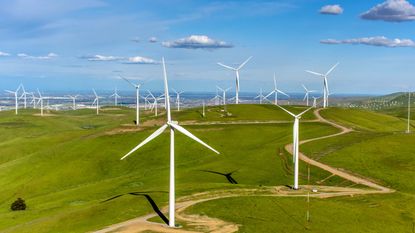
NextEra Energy
- Sector: Utilities
- Industry: Utilities – regulated electric
- Market value: $152.1 billion
- Median price target: $93.00 (22.4% implied upside)
NextEra Energy (NEE, $75.97) is typically found on lists of the best green energy stocks to buy. NEE is the world's largest producer of wind and solar energy. It owns Florida Power & Light, which is the biggest electric utility in the U.S., providing clean electricity to more than 12 million people. It also is a corporate leader in sustainability, having been awarded the S&P 500 Global Platts 2020 Energy Transition Award for ESG leadership.
The utility stock is currently undervalued as it was recently punished amid allegations the Florida utility violated state and federal campaign finance laws. Its head, Erick Silagy, has announced his retirement, but the utility has denied any wrongdoing.
Looking ahead, NextEra Energy CEO John Ketchum said in the company's latest earnings call that the Inflation Reduction Act is "transformational for our industry and our business."
Before the IRA, NextEra had largely qualified for two federal incentives – wind production tax credits and solar investment tax credits. But these incentives typically phase out or expire; some years they were extended, sometimes not. This uncertainty has had an impact on customers buying the product.
But now, Ketchum said the incentives are "clear" and "in place for a much longer period of time." The IRA also provides incentives for a domestic supply chain that will further lower the cost of U.S.-made renewables.
"We believe the IRA provides growth visibility for a broad range of low-cost clean energy solutions, in a predictable way and for a long time," Ketchum said. "In this environment, low-cost renewables will help drive long-term value for our customers and our shareholders and unitholders."
While the renewable energy stock has lagged so far this year amid the unwelcome headlines, it outperformed the S&P 500 in 2022 by 10% on a price basis. In total return, which is price appreciation plus dividends, Ketchum said the company has beat the S&P 500 over the three-, five-, 10- and 15-year periods.
NextEra is also one of the best dividend stocks, with Ketchum saying the company expects to raise its dividend by 10% a year through "at least" 2024.
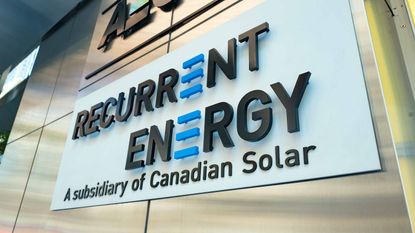
Canadian Solar
- Sector: Technology
- Industry: Solar
- Market value: $2.4 billion
- Median price target: $45.00 (25.5% implied upside)
Canadian Solar (CSIQ, $35.86) is one of Wall Street's best green energy stocks. CSIQ is a solar power company that provides integrated solutions including solar power products, services and systems. It is one of the world's largest makers of solar photovoltaic products, as well as one of the largest solar power plant developers. Canadian Solar sells to utilities, businesses and consumers.
The company said it has delivered more than 75 GW of solar modules to thousands of customers in over 160 countries – enough to power 17.7 million homes − with another 26 GW of solar projects and 31 GW of storage projects in the pipeline.
According to Deloitte's "2023 renewable energy outlook," residential solar demand is "growing faster than ever," up 35% in the first half of 2022 from the same period a year ago. This is due to households reacting to "rising retail electricity prices and weather-driven power outages," the report states.
Since 2019, CSIQ revenues have more than doubled from $3.2 billion to $7.5 billion for 2022. And earnings are up to $3.44 per share in 2022 from $2.19 per share in 2019.
Looking ahead, Canadian Solar expects total module shipments of 5.9 GW to 6.2 GW in the first quarter of 2023 and revenues to be in the range of $1.6 billion to $1.8 billion, with gross margin of 18% to 20%.
The average analysts' recommendation on the stock is Buy, according to Nasdaq.

SolarEdge Technologies
- Sector: Technology
- Industry: Solar
- Market value: $16.3 billion
- Median price target: $365.50 (34.2% implied upside)
SolarEdge Technologies (SEDG, $272.31) is featured among the best green energy stocks because it is the largest maker of solar inverters, which converts direct current from solar panels into alternating currents used in homes and electrical grids. According to Morningstar, its DC optimizer is the leader in solar residential rooftop installations; the company has expanded its sales to include business and utility clients.
Since 60% of the company's revenue comes from Europe, this "positions it well to navigate what could be a slowdown in U.S. residential solar demand in 2023 as California NEM 3.0 takes effect," writes analyst Brett Castelli in a research note.
California's Net Energy Metering (NEM) policy calls for homeowners to get credit when their solar panels push excess electricity onto the grid when the sun is shining. This credit offsets the cost of electricity they use at nightfall. Under NEM 3.0, the rates homeowners will get are 75% lower than before. This means less savings for the homeowner, which could hurt solar panel sales.
Beyond inverters, SEDG also expanded into energy storage, e-mobility, and uninterrupted power supply markets. However, the analyst believes two of these moves carry risks. An energy storage product "makes sense" but it departs from its policy of outsourcing manufacturing, he said. E-mobility may be a big and growing market but it requires more capital, carries execution risk and takes a long time to generate meaningful revenue.
SolarEdge reported 2022 revenue of $3.1 billion, up from $2.0 billion in the prior year. Net income, however, fell to $93.8 million ($1.65 per share) compared to $169.2 million ($3.06) in the year before.
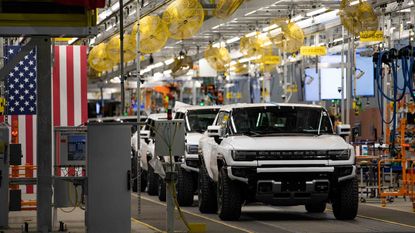
General Motors
- Sector: Consumer discretionary
- Industry: Auto manufacturer
- Market value: $48.6 billion
- Median price target: $46.00 (36.8% implied upside)
Why is General Motors (GM, $33.62) on this list of the best green energy stocks to buy? Because the carmaker is going all in on an electric future.
The company has said that it plans to invest $35 billion in electric vehicle (EV) and autonomous vehicle (AV) production through 2025. By mid-decade, GM plans to sell a million EVs a year in North America.
In a recent letter to shareholders, CEO Mary Barra said the company's Chevrolet Bolt EV and Bolt EUV had record sales in 2022, which "demonstrates the importance of affordable EVs" in our portfolio. Bolt sales rose 72% to 38,120 in 2022, still a pittance compared to Tesla's 1.3 million.
GM also deepened its investment in AV company Cruise, buying SoftBank's stake for $2.1 billion and pouring in another $1.4 billion. Cruise develops self-driving cars for ridesharing and delivery. The Origin is designed to operate without a human driver, as there is no steering wheel. Cruise was the first AV company to offer driverless rides in a major city: San Francisco.
Cruise reportedly is expected to start operating robotaxis in Austin, Texas, and Phoenix, Arizona, as well as more cities this year. As for delivery, Cruise is looking to expand as well. Walmart (WMT), which is an investor, is testing the service in Phoenix, according to Reuters.
GM has said Cruise can generate $50 billion in annual revenue by 2030.
GM, which sells vehicles under the Chevrolet, Buick, Cadillac, Baojun and Wuling brands, also jointly developed its Ultium battery platform with South Korea's LG Energy Solution to mass produce battery cells. GM is projecting that its next-gen Ultium packs will cost 60% less than existing batteries in use today with double the energy density. GM is reusing or recycling these batteries.
General Motors posted revenue of $156.7 billion in 2022, up from $127 billion in the prior year. Net income was $8.9 billion ($6.13 per share).

Amazon.com
- Sector: Consumer discretionary
- Industry: Internet retail
- Market value: $1.01 trillion
- Median price target: $135.00 (38.2% implied upside)
E-commerce giant Amazon.com (AMZN, $97.71) joins the list of green energy stocks to consider because it is far and away the largest buyer of clean energy in the U.S., according to trade group American Clean Power.
"Corporate buyers are a critical part of the energy transition" in America from fossil fuels to clean energy, the trade group's report said. "Their accelerated buying of clean energy provides an important source of demand, while their efforts to decarbonize their products and services puts pressure on their supply chain to do the same."
Last year, Amazon contracted capacity of 12.4 GW in total, with Facebook parent Meta Platforms (META) coming in a distant second at 8.7 GW and Alphabet's (GOOGL) Google third at 6.2 GW.
Most of this capacity is in solar energy, with more than 10.2 GW contracted – or a fifth of total solar capacity contracted in commercial and industrial. Meta and Google again ranked second and third, at 5.9 GW and 3.4 GW.
In wind, Amazon comes in third with 2.2 GW compared to Google, which topped the list at 2.8 GW and Meta second at 2.6 GW.
Moreover, Amazon said it is on track to meet its 100% clean energy goal five years earlier than the 2030 it previously projected.
What's more, Amazon co-founded The Climate Pledge in 2019, which commits companies to achieving net-zero carbon emissions by 2040 or a decade earlier than the Paris Agreement.
Amazon reported 2022 revenue of $514 billion – more than 9% higher than the year prior – but a net loss of $2.7 billion.
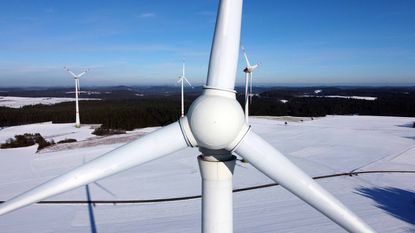
Ørsted
- Sector: Utilities
- Industry: Utilities – renewable
- Market value: $34.4 billion
- Median price target: $38.09 (42.4%% implied upside)
Ørsted (DNNGY, $26.74) is the largest multinational power company in Denmark. After selling its oil and gas fields in 2017, the company is now focused on renewables. It has the largest portfolio of offshore wind farm projects in Europe and is ramping up its American presence.
The company owns and operates the first U.S. offshore wind project, the Block Island Wind Farm, which replaced five diesel generators and now powers 17,000 homes in Rhode Island.
DNNGY said it is developing 5 GW of offshore wind capacity in Connecticut, Maryland, New Jersey and New York. It also is developing 4 GW of onshore wind, solar and storage projects in Texas, the Midwest and Southeast.
The company develops, constructs and operates wind farms, solar farms, energy storage facilities, renewable hydrogen and green fuels facilities and bioenergy plants. Ørsted operated 8.9 GW of offshore wind farms at the end of 2022, with the biggest concentration of operations in the U.K.
The company's efforts are coming through on its financial reports, with 2022 revenue up 70% over 2021 and more than tripling 2020 sales. Net income was also up year-over-year in 2022.
In addition to being one of Wall Street's best green energy stocks, DNNGY was also named the world's most sustainable company in 2022 by Corporate Knight's 2022 Global 100 Index.

Deborah Yao is an award-winning journalist, editor, and personal finance columnist who has held editorial roles at Kiplinger, The Wharton School, Amazon, The Associated Press, S&P Global (SNL Kagan) and MarketWatch. She specializes in writing and editing articles on finance and technology, with particular expertise in the areas of stock analysis, monetary policy, fintech, blockchain, macroeconomics, financial planning, taxes, among others. She has been published in The New York Times, USA Today, CBS News, ABC News, Wharton Magazine, and many other news outlets.
-
 Charitable Remainder Trust: The Stretch IRA Alternative
Charitable Remainder Trust: The Stretch IRA AlternativeThe SECURE Act killed the stretch IRA, but a properly constructed charitable remainder trust can deliver similar benefits, with some caveats.
By Brandon Mather, CFP®, CEPA, ChFEBC® Published
-
 Three Ways to Take Control of Your Money During Financial Literacy Month
Three Ways to Take Control of Your Money During Financial Literacy MonthBudgeting, building an emergency fund and taking advantage of a multitude of workplace benefits can get you on track and keep you there.
By Craig Rubino Published
-
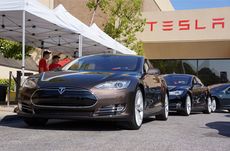 What Does Tesla Stock's Latest Slide Mean for Investors?
What Does Tesla Stock's Latest Slide Mean for Investors?Tesla stock is down more than 35% in 2024 and the company just announced layoffs. Here's what you need to know.
By Joey Solitro Published
-
 Stock Market Today: Stocks Reverse Lower as Treasury Yields Spike
Stock Market Today: Stocks Reverse Lower as Treasury Yields SpikeA good-news-is-bad-news retail sales report lowered rate-cut expectations and caused government bond yields to surge.
By Karee Venema Last updated
-
 Amazon Eyes $2 Trillion Market Cap as CEO Talks AI, Cost Cuts
Amazon Eyes $2 Trillion Market Cap as CEO Talks AI, Cost CutsAmazon CEO Andy Jassy thinks there’s "a long way to go" in all of its businesses and that could be good for investors.
By Joey Solitro Published
-
 Stock Market Today: Stocks Closed Mixed in Choppy Trading
Stock Market Today: Stocks Closed Mixed in Choppy TradingVolatility returned as market participants adjusted their expectations for rate cuts.
By Dan Burrows Published
-
 Stock Market Today: Stocks Rally After Blowout Jobs Report
Stock Market Today: Stocks Rally After Blowout Jobs ReportStocks soared into the weekend as investors brushed off strong payrolls data and lowered rate-cut expectations.
By Dan Burrows Published
-
 Stock Market Today: Stocks Swing Lower as March Jobs Report Looms
Stock Market Today: Stocks Swing Lower as March Jobs Report LoomsThe main indexes turned negative in mid-afternoon trading as all eyes turned to tomorrow morning's key employment update.
By Karee Venema Published
-
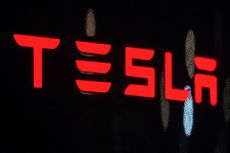 Can Tesla Stock Really Hit $2,000? Cathie Wood Thinks So
Can Tesla Stock Really Hit $2,000? Cathie Wood Thinks SoTesla epitomizes the convergence of three key technologies, Ark Invest's Cathie Wood says. Here's what you need to know.
By Joey Solitro Published
-
 Stock Market Today: Dow Sinks 396 Points as UnitedHealth Spirals
Stock Market Today: Dow Sinks 396 Points as UnitedHealth SpiralsLarge-cap healthcare stocks slumped after regulators set a disappointing reimbursement rate for Medicare Advantage plans.
By Karee Venema Published
